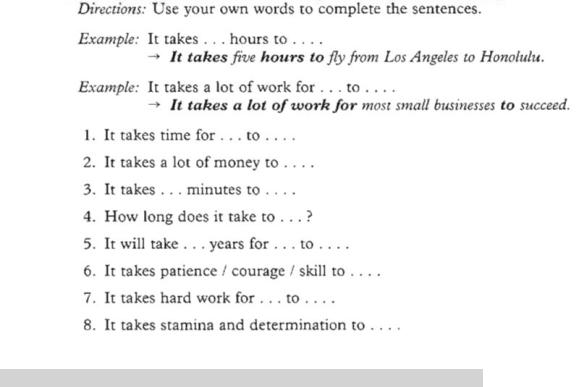
III(2)_The_Infinitive_St
.pdf
9.It’s pleasant to dance with the girl.
10.It’s difficult to explain his behavior.
11.It’s nice to have ice-cream for dessert.
12.It’s easy to give advice but it’s difficult to followit.
13.It’s interesting to discuss this story.
14.It’s not easy to calm an excited person.
15.It’s pleasant to call on her. She is always glad to receive guests.
17. Complete the following sentences according to the modal.
e.g. She is easy …….- She is easy to dance with.
1.The boy is hard……..
2.What he says is pleasant ……but rather hard…
3.The stories are interesting……
4.The sentence is easy…….and useful……
5.All she cook is nice……and delicious…
6.The lady is pleasant…….
7.She was light onher feel and easy…..
8.His thoughts are hard…….
9.Their behavior was difficult……..
10.This fruit is nice……
11.The matter is easy……….
12.The child is nice….but difficult…..
18. Translate into English. |
11 |
1.В этом кресле удобно спать.
2.Это заболевание трудно лечить.
3.Эти инструкции легко выполнять.
4.Его мысли трудно понять.
5.С ней приятно иметь дело.
6.Такие вещи трудно объяснить.
7.Ее настроение легко понять.
8.Такую роль интересно играть.
9.С надежными людьми приятно работать.
10.Пожилым людям обычно трудно угодить.
Noun /adverb + to be + inf.
19. Complete the sentences using the Infinitive according to the modal.
 :the subjectof the sentence can be expressed by a limited number of nouns, the mostcommon are: thing, problem, wish, idea, ambition, task, aim, job, etc.
:the subjectof the sentence can be expressed by a limited number of nouns, the mostcommon are: thing, problem, wish, idea, ambition, task, aim, job, etc.
The only thing youhave to do isto stay with the child.

His highest ambition |
|
|
|
to tell her every thing |
The job of a reporter |
|
|
|
to turnhis native village into a |
Dr. Johnson’sidea |
|
|
|
health resort |
His greatest wish |
|
is |
|
to expose his intentions |
The only sensiblething |
|
|
to go away |
|
All I want you to do |
|
was |
|
to stick to our decision |
The most he coulddo at the |
|
will be |
|
to give me advice |
moment |
|
|
|
to try to understand her idea |
The least we can do |
|
|
|
to write a monumental work on |
|
|
|
|
art |
20.Answer the question using the Infinitive.
1.What’s your aim in life?
2.What would you like your friend to do for you?(All I want.)
3.How do you see the job of an economist?
4.What’s your duty in the family?
5.What’s the foreign policy of this country?
6.What’s your highest ambition?
7.What did your parents threaten to do when you didn’t behave well in your childhood?
8.What are generous people willing to do?
9.What is a quick-tempered man inclined to do?
10.When a man proposes, what does awoman agree to do?
11.What can’t students afford to do?
12.When people yet married, what do they promise to do?
13.What are you planning to do in future? |
12 |
21.Translate into English.
1.Теперь тебе только остается поместить объявление в газету.
2.Единственным его желанием было найти постоянную работу.
3.Единственный способ не столкнуться с финансовыми проблемами – это экономить.
4.Все, что ему хотелось, - это избежатьразвода.
5.Первое, что необходимо сделать семье,- это посоветоваться с врачом, а потом уже решать, поместить больного в госпиталь или нет.
6.Все, что ей удалось сделать,- это найти работу внештатным журналистом в местной газете.
7.Наш план был в том, чтобыпривлечь внимание общественности к проблеме насилия в семье.
8.Ваша следующая задача– проверить факты перед тем, как печатать статью.
9.Последнее, что я хотел бы сделать, это причинить вам неудобства.

It’s + adj. + of someone + to do
 : we use this structure to comment on someone’s behavior. It’s mainly used after the following adjectives: kind, silly, stupid, nice, considerate, thoughtful, wise, clever, careless, charming, ect.
: we use this structure to comment on someone’s behavior. It’s mainly used after the following adjectives: kind, silly, stupid, nice, considerate, thoughtful, wise, clever, careless, charming, ect.
It’s stupidof him not to have given her flowers.
22. Make up sentences using the Infinitive.
e.g. It’s nice(bad, considerate) of you to go there.
It’s (was) bad |
|
|
|
to think that she and I once dined together |
It’s considerate |
|
of him, |
|
to admit the fact |
It’s silly |
|
|
to hurt people |
|
It’s wrong |
|
Sally, |
|
to remember the figures |
It’s charming |
|
our friends, |
|
to be rude to David |
It’s thoughtful |
|
my collegue, |
|
to be welcomed in such a way |
It’s clever |
|
his parents |
|
to fall asleep like that |
It’s (un) wise |
|
|
|
to start producing their own machine |
It’s disgraceful |
|
|
|
to give up singing because you have a poor voice |
13

23. Paraphrase the sentences according to the model.
Model: They were so kind to invite you to the party.
It was kind ofthem toinvite you.
1.Spending all yourmoney was foolish.
2.Your sending her flowers in hospital was a considerate gesture.
3.It’s your stupidity that made you expose yourself to danger swimming in a rough sea.
4.You are so generous, if you’ve contributed thatsum of money to the Charity Fund.
5.You are so careless. You have gained weight before the competition.
6.What a thoughtlessbehaviour! You shouldn’t have involved him in this project.
7.Only a ruthless man like you could cause me so much trouble.
8.You are so clever, you have taken all the precautions.
9.Living beyond yourmeans is unwise.
10.To oppose the proposed project was a brave step of yours.
24. Translate into English. |
|
|
|
1. |
C твоей стороны было бы глупо подавать на развод. |
|
|
2. |
|
||
3. |
Со стороны Джорджа было бы очень мило пригласить ее танцевать. |
|
|
4. |
Как мило с вашей стороны предложитьмне эту поездку. |
|
|
|
Я думаю, с вашей стороны было бы беспечно оставлять своего ребенка на попечение |
|
|
5. |
соседей. |
|
|
6. |
Для вас не характерно так ругаться. |
|
|
7. |
Это невежливо с ее стороны отклонять приглашение. |
|
|
8. |
Это неразумно, что родители Джейн вмешиваются в ееотношения с мужем. |
14 |
|
9. |
Плохо, что она не воспользовалась этой возможностью. |
|
|
|
Глупо с вашей стороныпокупать в кредит (on credit) вещи, которые вы не можете себе |
|
|
позволить.
adj + inf (act/pass)
 : the Infinitive is used after various kinds of adjectives the mostcommon are:afraid, anxious, ashamed, delighted, glad, good, happy, lucky, thankful, surprised, sorry, willing, etc.
: the Infinitive is used after various kinds of adjectives the mostcommon are:afraid, anxious, ashamed, delighted, glad, good, happy, lucky, thankful, surprised, sorry, willing, etc.
I am sorry to have done you harm.
25. Complete the sentences.
He’s stillvery anxiousto see you.
She’s anxious… |
to have done you harm |
I felt reluctant… |
to come to my place |
He would be crazy… |
to be raised during the talks |
I must take Phil with me, he’s keen… |
to go out that night |
He was sorry… |
to be served |
You’ll be relieved… |
to be talked about it |
Dinner was ready… |
to hear the document is now in their hands |
She is happy… |
to disturb you / to have disturb |
The subject isn’t likely… |
to meet the President |
The Infinitive may serve as object in sentences withitas a subject.

The most common verbs after which the Infinitive is used in this function are:to amaze, to annoy, to delight, to puzzle, to shock, to occur, to surprise, to trouble and others.
|
It pleased her particularly to see her children playing. |
|
It never occurred to him to pretendthat he had no influents on events. |
There are a number of setphrases to remember.
Itdoes me good to get up early in the morning.
Itcouldn’tdoany harm to take her out of town.
Ittook her severaldaysto realize it.
Itwas his turnto cook dinner.
Itwas up tothe girl to decide whether or not to accept the invitation.
It’s time to get down to work.
26.Translate into English using the Infinitive an object.
1.Я не желаю менять свое мнение.
2.Он потребовал, чтобы ему предоставили возможность доказатьэто.
3.Я прошу, чтобы меня выслушали.
4.Почему вы не потребовали, чтобы вам дали копию?
5.Я не могу позволить себе купить такую дорогую машину.
6.Мой друг не осмелился сказать мне правду.
7.Стив предложил подвести меня до станции.
8.Сегодня моя очередь мыть посуду.
9. Ему потребовалось полчаса, чтобы написать письмо другу. |
15 |
|
10.Джек пообещал принять участие в соревнованиях, и теперь он сожалеет, что сделал это.
11.Маловероятно (to be unlikely), что ваша сестра приедет на репетицию сегодня, хотя она и очень хочет играть главную роль в нашем спектакле.
12.Вам пора поискать новую работу.
13.Вам решать, кому из ваших друзей можно доверять.
14.Вам потребуется несколько дней, чтобы решитьэту проблему.
15.Родителям не повредит (do smb. good/bad) уделять больше внимания своим детям.
16.Я притворился, что не заметил его смущения.
17.Я постараюсь не забыть послать им телеграмму.
18.Он не любил, когда ему говорили об этом.
19.Джон был рад познакомиться с друзьями Елены.

. . . for smb/smth to do
27. Use the Infinitive with for-phrases.
e.g. It’s hard (impossible, easy) for her to carry this bag. The teacherwas waitingfor Jack to raise his hand. It’s notfor him to explain the matter.
1.This is the matter that you mustpay attention to.
2.The best thing that he can dois to fine a better-paid job.
3.She is rather late whichis unusual.
4.It’s necessary that he shouldstopliving beyond your means.
5.She explained everything. It was not difficult.
6.Her father made the decision.It’s the usual thingin her family.
7.It would be better if you split up.
8.He held the door open to let his parents come in.
9.The traffic was too heavy.We couldn’t cross the road.
10.You need’t leave us so early (There’s no need…)
11.The problem was comparatively easy.He solved it in half anhour.
12.He is just the man whom you should consult.
28.Paraphrase the sentences according to the model.
16
Model: He won’t catch the six thirty train. It’s impossible.
It’s impossible forhim tocatch the six thirty train.
1.She faced out the opposition inthedebate, but it wasn’t easy.
2.We shouldn’tlet his ideas gain ground in the country. It’s vital for us.
3.She works so fast I can’t keep pace with her. It’s difficult.
4.I decided to move nearer to my office as I was getting tired of commuting every day. It’s tiresome.
5.You have cheated to get what you wanted, but I’m warning you, don’tpush your luck. It’s dangerous.
6.I advise that you should gain some experience working as a salesman. It would be useful for you.
7.Just look! Jane has run out of patience, she is furious. It’s so unusual for her.
8.The scandal you are involved in caused a stir in the society. It’s bad for your reputation.
9.He runs both the household andhis firm with the set of iron rules. It’s typical of him.

29. Translate the sentence into English using the for –Infinitive Construction.
1.Самое лучшее, что вы можете сейчас сделать– это поехать в отпуск на юг.
2.Он попросил принести ручку и бумагу.
3.Этот текст достаточно легкий,чтобы вы могли прочитать его без словаря.
4.Ему ничего не остается делать, как немедленно выехать в Москву.
5.Сделать это должен был он.
6. Будет неразумно, если он сейчас уедет из России. |
17 |
|
7.Первое, что мы должны сделать – это заказать билеты.
8.Вопрос был слишком неожиданным, чтобы я мог на него ответить.
9.Я подчеркнул эти предложения,чтобы вы могли их проанализировать.
10.Он подождал, пока я сяду в кресло.
11.Не вам ставить условия!
12.Нам ничего не остается делать, как веселить самих себя.
13.Им невозможно было описать свою жизнь вдеревне.
14.Роберт ждал прихода ночи, чтобы выскользнуть из дома.
15.Мой дом всегда готов к тому, чтобы любой мог войти и расположиться.
16.Дорогой, сейчас не время нам спорить.

Complex Subject
with verbs in the Active Voice
|
|
noun/pronoun + active verb + to-infinitive |
|
||||
|
|
|
Complex Subject |
|
|
|
|
|
|
|
|
|
|
||
|
seems / seemed |
|
to do sth |
кажется, казалось, |
|
||
|
appears / appeared |
|
to be done |
по-видимому |
|
||
sb |
happens / happened |
|
to be doing sth |
случилосьтак, что |
|
||
|
proved |
|
|
to have done sth |
оказалось |
|
|
|
turned out |
|
|
to have been doing sth |
|
|
|
|
|
|
|
to have been done |
|
|
|
|
|
|
|
|
|
||
|
|
e.g. Her eyeswere red. She seemed to have been crying. |
|||||
|
|
|
|
|
|
|
|
|
|
sure |
|
to do sth |
несомненно, |
|
|
|
is |
certain |
|
to be done |
весьма вероятно |
18 |
|
|
|
|
|
||||
|
|
||||||
sb |
was |
bound |
|
to be doing sth |
обязательно |
|
|
|
will be |
likely |
|
to have done sth |
вероятно |
|
|
|
|
unlikely |
|
to have been doing sth |
вряд ли |
|
|
|
|
|
|
to have been done |
|
|
|
|
|
|
|
|
|
|
|
|
|
|
e.g. He islikelyto arrive a bit late. |
|
|
|
|
|
|
|
|
|
|
|
|
30. Translate into Russian.
1.The discussion appears to have been friendly and fruitful.
2.He seems to be sincere but I don’t completely trust him.
3.To our surprise the stranger turned out to be an old friendof my mother’s.
4.If you happen to find it, please let me know.
5.He seems to be satisfied to be doing nothing.
6.His private life is unlikely to have any bearing on his competence as a manager.
7.His decision proved to be a good one. 8. Knowing Jim, he is bound to be late.

31. Complete the sentences with the proper forms of the Infinitive.
1.There appears _____________ (to be) a mistake over the numbers in your yesterday’s report.
2.The building appears ________________ (to use) as a hospital during the war.
3.There appears ______________ (to be) very little we can do about it.
4.She seems ___________________ (to change) her mind.
5.The storm turned out ___________________ (to miss) Florida.
6.His statement turned out_____________ (to be) false.
7.William’s words seemed ___________________ (to calm) her down a little.
8.She is bound ________________ (to findout) the truth sooner or later.
9.George’s overseas voyage seems ________________ (to help) him come to terms with some dark facts about his roots.
10.In the past two years Debbie seems ________________________ (to do one’s utmost) torealize her full potential as a scholar.
32. Paraphrase the sentences, using the above patterns with the infinitive. |
|
|
||
Model: |
It seems/ appears that she knows everything about it. |
|
||
|
|
She seems/ appears to knoweverything about it. |
|
|
|
|
He apparently did not knowit. |
|
|
|
|
He didn’t seem (appear) to knowit. |
|
|
1. |
It seemed that he had lost interest in the subject. |
|
||
2. |
|
|||
3. |
It seemed that the house hadn’t been lived in for a long time. |
19 |
||
4. |
It doesn’t seem the customers are served here properly. |
|
||
|
It seems he has been collecting stamps since he was a boy. |
|
||
|
|
|||
5.It appears that a lot of immigrants are involved in squattering.
6.He was silent for a moment. It seemed that he was searching his memory.
7.It seemed that there was no risk in asking him the question.
8.It seemed there was no other settlement to theproblem.
9.Apparently this job offers alluringopportunities.
10.It seems that he has been looking forward to meeting you all the time.
11.I am not sure that anyone has gained experience by being idle.
12.It seems that they haven’t made any changes in the plan.
13.It appears that his new book attracted everybody’s attention.
14.It seems that there is a great difference between these two samples.
15.It appears we have involved him in a dangerous mission.
16.It appearsthat there are different opinions on this subject.
33.Complete the sentences with the infinitive forms of the verbs in brackets.
Model: He seems (choose) books for a whole hour.
He seems tohavebeenchoosing books for a whole hour.
1.He didn’t answer at once. He seemed (clear) his throat.(to be clearing)
2.You always seem (leave) your things around the place.(to leave)
3.She looks sad. She appears (hear) the news.(to have heard)
4.Their financial situation has become better. They appear (sign) on for social welfare. (to have signed)
5.She didn’t seem (look) at me but at somebody behind.(to be looking)
6.She heard the remark, but she didn’t appear (hurt). (to be hurt)

7.He seems (wear) the same suit the whole year.(to have been wearing)
8.She didn’t seem (interest) in the problem.(to be interested)
9.He seems (fail) with his new job.(to have failed)
10.Nothing seems (gain) by moving to a metropolis.(to be gained)
11.The letter doesn’t seem (reach) him.(to have reached)
12.Good work. Your chances for a promotion seem (enhance).(to be enhancing)
13.They seem (use) this method for years.(to have been using)
14.Why did he rush away so suddenly? He seems (have) some business to attend to.(to have)
34.Translate the following sentences into English.
1.Все, казалось, было в полном порядке.
2.Кажется, ее брат копит деньги на автомашину.
3.Похоже на то, что они использовали эти сведения.
4.Похоже на то, что этот факт уже был упомянут.
5.Его родители, по-видимому, живут здесь давно.
6.Кажется, она пытается управлять твоей жизнью.
7.У нее, по-видимому, хороший вкус.
8.Вероятно, преподаватель был не доволен ее ответом.
9.Мне кажется, он испытывает сильнейшую боль.
10.Я что-то не помню всех частностей этого дела.
11.Похоже на то, что эта история вызвала отрицательную реакцию в обществе.
12.Казалось, что мы все живем в трущобах.
13.Не похоже, что ты нашел подходящее жилье.
35. Paraphrase the sentences using the above infinitive pattern. |
20 |
|
Model: It so happened that I took the wrong turning.
I happenedto take the wrong turning.
1.It so happened that they missed the five o’clock train.
2.Do you know, by any chance, who contributed their money to Children’s Fund?
3.We were quite by chance picked up by a passing car.
4.It was quite unexpected for them to wander into slums.
5.Do you by any chance know where such things are sold?
6.It so happened that they picked the wrongperson for the job.
7.They met by chance. They both were commuters.
8.It so happened that the book dealt with a problem that interested me very much.
9.It so happened that he recalled my telephone number just in time.
36.Complete the following sentences according to the model (think of your own answers).
Model: They picked him for the job but he …
turnedoutto beunfit for the job. and he … provedto be a genius.
1.They had been looking forward to the party but/and when it came, it … (be dull and uninteresting).
2.The parents were against their marriage but/and the man … (be an ideal husband for their daughter).
3.They employed him and/buthe … (be the bestclerk they had everhad).
4.I didn’t expect much of the film but/and it …(bequite thrilling).
